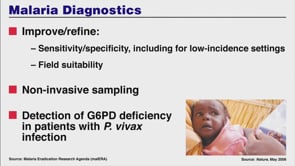Anthony S. Fauci: Ending Malaria – The Role of Biomedical Research
Collaborator(s): World Health Organization (WHO), Switzerland
Published: 09/09/2019
This presentation was part of the WHO’s Forum on rising to the challenge of malaria eradication meeting, held in Geneva on September 9, 2019.
Title: Ending Malaria: The Role of Biomedical Research
Speaker: Anthony S Fauci, National Institute of Allergy and Infectious Diseases (NIAID), NIH
Session title: Innovating for Transformation
Venue: WHO/UNAIDS, Kofi A. Annan Conference Room, WHO Headquarters, Geneva Switzerland
Summary:
Research and R&D are essential if we are to rise to the challenge of malaria eradication. At the World Health Organization Forum ‘Rising to the challenge of malaria eradication’ on September 9th 2019, Dr Fauci presented the importance and the necessity of biomedical research across the continuum from control, elimination to the eradication of malaria. In the video presentation above, Dr Fauci discusses five keys arenas of malaria biomedical research: diagnostics; therapeutics: vaccines; other forms of immunoprophylaxis and vector control, emphasizing their significance and the complications in each.
Dr Fauci describes the need to refine and improve current methods in malaria diagnostics especially around non-invasive sampling. Diagnostics need to be specific and sensitive enough to include changes in lower incident settings especially as countries move towards elimination. A longstanding obstacle towards eradication has been parasite resistance. A 2018 study published in Science describes how the process of saturation mutagenesis was utilised for parasite gene identification. The results showed that >2680 essential genes in the malaria parasite were identified which Fauci further explains, “if you can identify an essential gene…that will give you numerous targets to overcome resistance to various antimalarials”.
In malaria vaccine development, a number of challenges persist, e.g., limited antigens, efficacy levels, and durability are a few. Currently, the two main approaches concerning vaccine development have been subunit vaccines or whole parasite methods. Nonetheless much more needs to be done and improved to develop successful vaccine solutions.
Dr Fauci talks of immunoprophylaxis as a different approach to potentially prevent malaria, as seen in two studies from 2018 where monoclonal antibodies were used to define new sites of vulnerability of Plasmodium falciparum circumsporozoite protein (ref, ref). Vector control continues to be essential to prevent malaria and novel approaches such as gene drive and mosquito targeting biopesticides are emerging.
One specific malaria programme that the NIH has funded are the eleven International Centres for Malaria Research (ICEMR). The ICEMR model emphasises innovative research that centres on laboratory and field dialogue to develop solutions with the greatest impact.
THEMES: Basic Science | Capacity Building | Diagnostics | Drug Resistance | Epidemiology | Immunology | Vaccines | Vector Control


